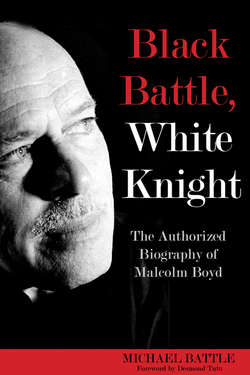Читать книгу Black Battle, White Knight - Michael Battle - Страница 8
ОглавлениеArchbishop Desmond Tutu
One of the most difficult tasks is to know yourself. This biography beautifully provides such an examination. Michael Battle invites you into a journey not only of seeing the extraordinary life of Malcolm Boyd, but consequently seeing yourself. After all, isn't this why we read biographies — to make sense of ourselves through others? In South Africa we call this sensibility Ubuntu. We say this because a person is a person through persons. We need each other to be human . . . to be a child of God.
Michael will describe later in this book about his first encounter with Malcolm. I was indirectly involved. For about two years (1993 and 1994), Michael lived in residence with me near the end of my time as Archbishop of Cape Town and before my chairmanship of the Truth and Reconciliation Commission. I have since learned from Michael that these were formative years in his own life in the discovery of spiritual direction. I think what Michael means is that he saw how I regularly engaged my own spiritual director and learned to apply such direction to the difficult journey of knowing myself in the world.
I pray that Malcolm proves to be as powerful to Michael as my own spiritual directors proved powerful in my life. One in particular was the Rev. Francis Cull. Francis was like a character out of a Tolkien novel— short, stocky, and with a white beard. Francis's words were measured as he would tell me the work of the spiritual life was not so much to find something as to be someone in God.
I learned early in my vocation the difficult task of looking at self through the eyes of others—the greatest other being God. Without such engagement (often times confrontation), I would not have had the longevity and quality of life entrusted to me.
Although many may see me as a political agent against apartheid, I learned to see my agency more as a spiritual battle, hence my vocation occurred through habits of deep spirituality. This reminds me of a story given to me about desert spirituality.
One day two desert mystics were walking beside the sea. The younger mystic was thirsty and said to the older one, “Father, I am very thirsty.” The older one said a prayer and then said to the younger, “Drink some of the sea water.” The water proved sweet when the younger mystic drank some. He even poured some into a leather bottle for fear of being thirsty later on. Seeing this, the old man asked the younger one why he was taking some. The younger mystic said to him, “Forgive me, it is for fear of being thirsty later on.” Then the old man said, “God is here, God is everywhere. You do not need to be afraid.”
This biography (and in some ways autobiography) is more like these two mystics searching for water and God. Michael is the younger one and Malcolm the older. Malcolm's genius has been to show the world that God is everywhere, even for those who say they do not believe in God. The prayers in Malcolm's spiritual classic Are You Running with Me, Jesus? have deeply affected human lives throughout the world. He writes poignantly and powerfully about the human condition of becoming a slave of self, with one's soul parched, dreams crumbled, and energy stifled. Yet at the same moment one can pray (Malcolm tells us) “for a voice to cut through heavy silence, hear laughter, see a burst of light, and start to care again.”
On the surface, Malcolm and Michael seem to be an odd couple. One is an octogenarian, and the other a late baby boomer. One is gay in a long-term partnership and the other is heterosexual, married with three children. One is white and the other is black. But the similarities far outweigh the differences, the chief similarity being their mutual search for God here and everywhere.
Because I have been with Michael through many of his own rites of passage—ordaining him an Anglican/Episcopal priest, officiating his wedding to Raquel, baptizing their three children, Sage, Bliss, and Zion—I am deeply invested in the outcome of Michael's life. Therefore, I am happy that Michael has found himself a spiritual director in Malcolm. Incidentally, Malcolm is celebrating the twenty-seventh anniversary of his partnership-relationship with noted gay journalist-editor Mark Thompson.
As I have learned more about Malcolm's life, I understand now how he in fact knows where the water is . . . where God is. Malcolm searched wide and far, often in dangerous places. He was ahead of his time, being a white civil rights prophet on behalf of people of color (Malcolm was a Freedom Rider for African-American justice in the U.S. in 1961), protesting against tyranny and war (he was arrested in the Pentagon during a Peace Mass to protest the Vietnam War), asserting God's inclusivity for all people including gays, and offering prayer in actions as well as words.
Lastly, Malcolm is a fellow elder; this is important. We have responsibilities to the younger generations much like a North Star responsibly guides us beyond treacherous waters. May you follow Malcolm in this book and in so doing discover yourself in a much deeper way. But be warned. This will be a difficult and demanding journey, requiring spiritual direction. If you're not willing to look at your own life, this will be a challenging book to read, hence its title Black Battle, White Knight.
